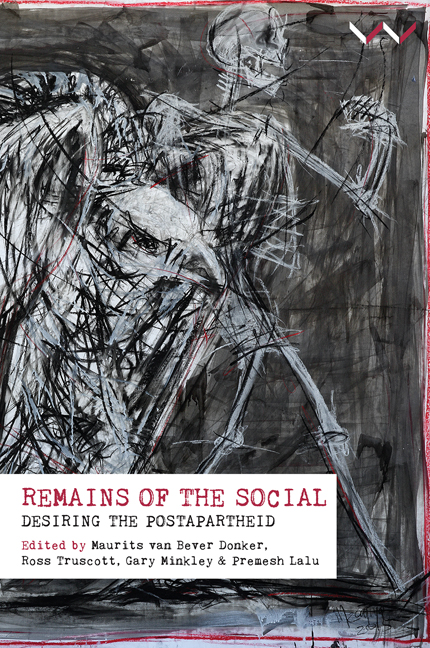Book contents
- Frontmatter
- Contents
- Acknowledgements
- Preface
- Chapter 1 Traversing the Social
- Chapter 2 The Mandela Imaginary: Reflections on Post-Reconciliation Libidinal Economy
- Chapter 3 The Return of Empathy: Postapartheid Fellow Feeling
- Chapter 4 The Ethics of Precarity: Judith Butler's Reluctant Universalism
- Chapter 5 Hannah Arendt's Work of Mourning: The Politics of Loss, ‘the Rise of the Social’ and the Ends of Apartheid
- Chapter 6 Souvenir
- Chapter 7 Re-Cover: Afrikaans Rock, Apartheid's Children and the Work of the Cover
- Chapter 8 The Graves of Dimbaza: Temporal Remains
- Chapter 9 The Principle of Insufficiency: Ethics and Community at the Edge of the Social
- Chapter 10 The Trojan Horse and the ‘Becoming Technical of the Human’
- About the Contributors
- List of Figures
- Index
Chapter 5 - Hannah Arendt's Work of Mourning: The Politics of Loss, ‘the Rise of the Social’ and the Ends of Apartheid
Published online by Cambridge University Press: 21 April 2018
- Frontmatter
- Contents
- Acknowledgements
- Preface
- Chapter 1 Traversing the Social
- Chapter 2 The Mandela Imaginary: Reflections on Post-Reconciliation Libidinal Economy
- Chapter 3 The Return of Empathy: Postapartheid Fellow Feeling
- Chapter 4 The Ethics of Precarity: Judith Butler's Reluctant Universalism
- Chapter 5 Hannah Arendt's Work of Mourning: The Politics of Loss, ‘the Rise of the Social’ and the Ends of Apartheid
- Chapter 6 Souvenir
- Chapter 7 Re-Cover: Afrikaans Rock, Apartheid's Children and the Work of the Cover
- Chapter 8 The Graves of Dimbaza: Temporal Remains
- Chapter 9 The Principle of Insufficiency: Ethics and Community at the Edge of the Social
- Chapter 10 The Trojan Horse and the ‘Becoming Technical of the Human’
- About the Contributors
- List of Figures
- Index
Summary
No revolution has ever solved the ‘social question’ and liberated men from the predicament of want, but all revolutions … have followed the example of the French Revolution and used and misused the mighty forces of misery and destitution in their struggle against tyranny and oppression
(Arendt, On Revolution 112).Politicization, for example, is interminable, even if it cannot and should
not ever be total
(Derrida, ‘Force of Law’ 971).The ‘rise of the social’ constitutes the demise of politics and yet there is a politics that rises from these ashes – a politics occasioned, precisely, by the emergence of the social question as inaugurating a particular kind of loss. This politics of loss is a politics of the social. Following the work of Hannah Arendt, I accept the twofold contention that ‘loss is not only constituted by, but is constitutive of, the social’ (Truscott, Van Bever Donker & Minkley 1). I begin with Arendt's definition of the social question as what ‘we may better and more simply call the existence of poverty’ (On Revolution 60). I continue to follow her in her argument that the loss at stake, as the constituted/constitutive loss that marks the ‘rise of the social’, is the loss of politics. However, I take my leave of Arendt to the extent that I argue that she, unwittingly perhaps, politicises the rise of the social precisely through her mourning for the loss of politics.
The thesis as regards the politics of loss as a politics of the social, read in the light of Arendt's definition of the social as the question of poverty, should not be taken to imply an argument that the loss of politics is somehow responsible for the existence of material poverty, for it is hardly the case that the factual existence of scarcity and poverty through the ages is or was caused by the loss of the particular kind of politics that Arendt considered invaluable. Yet, at the same time, in an age marked by what Jean-Luc Nancy and Philippe Lacoue-Labarthe have called the ‘retreat of the political’ (122) and Slavoj Žižek, with reference to Giorgio Agamben, ‘post-political’ biopolitics (‘A Permanent Economic Emergency’ 92), the possibility of a retrieval of politics depends, to an ever-increasing extent, on a concern with the factual existence of poverty.
- Type
- Chapter
- Information
- Remains of the SocialDesiring the Postapartheid, pp. 117 - 145Publisher: Wits University PressPrint publication year: 2017



